2-Personal Business Plan v1 Directions PDF

| Title | 2-Personal Business Plan v1 Directions |
|---|---|
| Course | Managerial Accounting |
| Institution | John Carroll University |
| Pages | 2 |
| File Size | 73.2 KB |
| File Type | |
| Total Downloads | 54 |
| Total Views | 129 |
Summary
fun...
Description
In this assignment, students are forced to think of themselves as a company. This is not an academic process, and it isn’t completed in teams. Students do this assignment individually, and essentially must figure out how they offer value to their world. They will complete this assignment at the beginning of the course, as a way to introduce themselves to each other with some depth. They will also complete this at the end of the semester, when they will reflect on the changes from the first Personal Business Plan they completed at the beginning of the course. Topic Guidance Questions Required To Answer What is your future vision? This is your big picture perspective. Fast forward to some time at least five years in the future. You pick the future date. ● Where in the world are you living, studying or working? Identify at least three places that you hope to do business in the future. ● What do you enjoy doing? ● What personal or professional skills would you most like to develop? ● What are your values? ● How are you creating value for your family, school, company, community, and the natural environment? Present plans and passions Now jump back to the present. Answer the rest of the questions to help develop your personal business plan to achieve your future vision. Hint: Most of us have no idea what we want to do in the future. OK to brainstorm a bunch of options. Then, focus your personal business plan on one opportunity that you believe is your most likely path. (It is very hard to explore more than one opportunity in 5 pages!) ● What opportunities could help you to achieve your future vision? Make a list. ● What is a specific goal you wish to achieve in the next several years? ● Who are the key customers, influencers, stakeholders you need to delight in order to achieve this goal and what is each person’s specific pain or need? ● What are your skills? What are you especially good at? (A few examples include: negotiating, writing, creating presentations, giving presentations, listening, coaching, writing software, user interface design, mastering multiple languages, etc.) ● What’s your story? Write a personal positioning statement. You are the product. Relative to your target customers, what differentiates you from the competition? ● How will you reach, connect with or influence your customers? ● What risks could upset your plans? How can you prevent these risks from happening? What are your contingency plans if they happen? Required Exhibit You should include at least one exhibit within your five (5) page limit, which can be “any combination of graphics or quantitative analysis [they] desire”. Examples of exhibits: ● A resume (current and/or future) ● A decision tree showing paths to a number of future career options ● A specific “short list” of attractive jobs, company names, and key audiences ● Segmentation of different organizations’ readiness to accept your value package using Geoffrey Moore’s adopter categories ● A chart addressing the risks, mitigation strategies, etc. associated with your Reality Test Below are required and recommended readings/viewings to help prepare an effective Personal Business Plan:
Category Readings/Viewings Required ● " The Secret Sauce of Silicon Valley " in What I Wish I Knew When I Was 20 , Tina Seelig ● Values , from the Stanford Technology Ventures Program ● Finding Our Values: A New Era of Entrepreneurship Training , Tom Byers, eCorner Recommended ● Designing Music by Kai Kight (BS ME 2014) (video) ● TED Talk: Meg Jay - Why 30 is Not the New 20 (video) ● Stanford students: Leave Your Legacy (video) ● TED Talk: Emilie Wapnick - Why some of us don't have one true calling (video) ● Lady Gaga and the Life of Passion by David Brooks, New York Times ● Why Tech Founders Need a Moral Compass , by Steve Blank, eCorner ● Who Will Teach Silicon Valley to Be Ethical? , by Kara Swisher, New York Times ● Byers, Thomas H., Richard C. Dorf & Andrew J. Nelson (2015) Technology Ventures: From Idea to Enterprise , 4th Edition Chapter 2, 3, 7, 8, 9, 11, 12, 15, 18, 19. ● Kawasaki, Guy (2015), The Art of the Start 2.0 , Portfolio/Penguin, New York, NY. Other valuable resources ● Blank, Steven Gary (2012), The Startup Owner’s Manual . ● Bolles, Richard Benton, (2016) What Color is your Parachute? A Practical Manual for JobHunters & Career-Changers , Ten Speed Press, Berkeley, CA. ● Covey, Stephen R. (1990) The Seven Habits of Highly Effective People , Fireside Books, Simon & Schuster, New York, NY. ● Hoffman, Reid and Ben Casnocha (2012) The Startup of You , Crown Business, Random House, New York, NY. 14...
Similar Free PDFs

CUE- Business-PLAN - Business plan
- 10 Pages

Business-Plan - Business plan Enc
- 48 Pages

BUSINESS RESEARCH FINAL-v1.
- 80 Pages
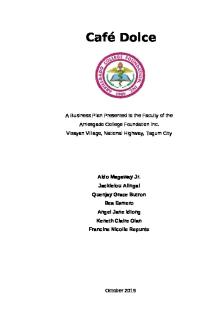
Business Plan
- 26 Pages

Business PLAN
- 3 Pages
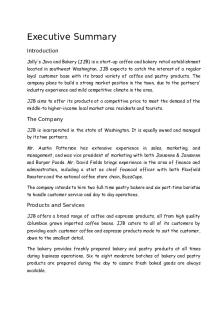
Business PLAN
- 21 Pages
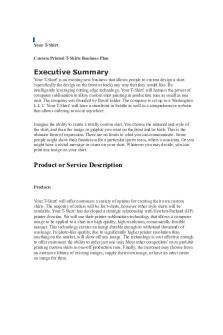
Business PLAN
- 10 Pages

BUSINESS PLAN
- 24 Pages
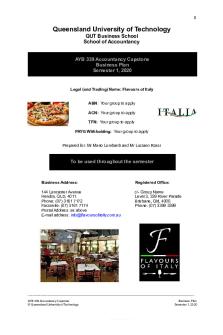
Business Plan
- 28 Pages
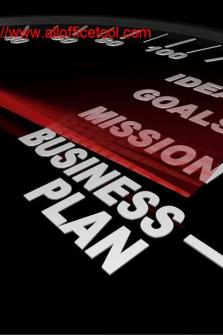
Business Plan
- 21 Pages
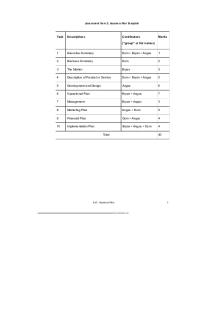
Business plan
- 40 Pages

Business Plan
- 47 Pages

Business Plan
- 10 Pages
Popular Institutions
- Tinajero National High School - Annex
- Politeknik Caltex Riau
- Yokohama City University
- SGT University
- University of Al-Qadisiyah
- Divine Word College of Vigan
- Techniek College Rotterdam
- Universidade de Santiago
- Universiti Teknologi MARA Cawangan Johor Kampus Pasir Gudang
- Poltekkes Kemenkes Yogyakarta
- Baguio City National High School
- Colegio san marcos
- preparatoria uno
- Centro de Bachillerato Tecnológico Industrial y de Servicios No. 107
- Dalian Maritime University
- Quang Trung Secondary School
- Colegio Tecnológico en Informática
- Corporación Regional de Educación Superior
- Grupo CEDVA
- Dar Al Uloom University
- Centro de Estudios Preuniversitarios de la Universidad Nacional de Ingeniería
- 上智大学
- Aakash International School, Nuna Majara
- San Felipe Neri Catholic School
- Kang Chiao International School - New Taipei City
- Misamis Occidental National High School
- Institución Educativa Escuela Normal Juan Ladrilleros
- Kolehiyo ng Pantukan
- Batanes State College
- Instituto Continental
- Sekolah Menengah Kejuruan Kesehatan Kaltara (Tarakan)
- Colegio de La Inmaculada Concepcion - Cebu


